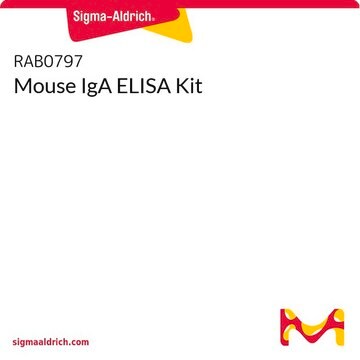RAB0799
Mouse IgE ELISA Kit
Synonym(s):
IgE, Immunoglobulin E
Sign Into View Organizational & Contract Pricing
All Photos(1)
About This Item
UNSPSC Code:
41116158
NACRES:
NA.32
Recommended Products
species reactivity
mouse
technique(s)
ELISA: suitable
assay range
inter-assay cv: <10%
intra-assay cv: <12%
shipped in
wet ice
storage temp.
−20°C
General description
Mouse IgE ELISA (Enzyme-Linked Immunosorbent Assay) kit is an in vitro enzyme-linked immunosorbent assay for the quantitative measurement of a target protein in biological samples, such as serum, plasma, cell culture supernatants, urine and cell and tissue lysates. Immunoglobulin E (IgE) is involved in the acute allergic reactions. It is also involved in the chronic inflammatory allergic diseases.
The antibody pair provided in this kit recognizes Mouse IgE.
Application
Mouse IgE ELISA (Enzyme-Linked Immunosorbent Assay) Kit has been used in the quantification of immunoglobulin E (IgE) levels in bronchoalveolar lavage fluid. It has also been used in the quantification of IgE levels in the sera of mice .
Other Notes
A sample Certificate of Analysis is available for this product.
Please type the word sample in the text box provided for lot number.
Please type the word sample in the text box provided for lot number.
Signal Word
Warning
Hazard Statements
Precautionary Statements
Hazard Classifications
Met. Corr. 1
Storage Class Code
8A - Combustible corrosive hazardous materials
Flash Point(F)
Not applicable
Flash Point(C)
Not applicable
Certificates of Analysis (COA)
Search for Certificates of Analysis (COA) by entering the products Lot/Batch Number. Lot and Batch Numbers can be found on a product’s label following the words ‘Lot’ or ‘Batch’.
Already Own This Product?
Find documentation for the products that you have recently purchased in the Document Library.
Camila F Bezerra et al.
Chemico-biological interactions, 274, 138-149 (2017-07-16)
Many thousands of plants are disseminated worldwide in traditional and folk medicines based on the belief that their leaves, roots, seeds, bark or secretions, when adequately handled, can treat, alleviate or ameliorate numerous disease symptoms. Calotropis procera (Apocynaceae) is a
Erik van Tilburg Bernardes et al.
Nature communications, 11(1), 2577-2577 (2020-05-24)
The gut microbiome consists of a multi-kingdom microbial community. Whilst the role of bacteria as causal contributors governing host physiological development is well established, the role of fungi remains to be determined. Here, we use germ-free mice colonized with defined
Lena L M N Zwickl et al.
Veterinary dermatology, 29(3), 222-e80-222-e80 (2018-02-10)
Total IgE concentrations are higher in dogs than in humans. Persistent Toxocara canis larval infection is prevalent in dogs and is associated with substantial specific antibody reactions. A correlation, however, between total IgE and T. canis-specific antibody levels in dogs has
Keiichiro Mine et al.
EBioMedicine, 23, 46-51 (2017-08-23)
Type 1 diabetes (T1D) is known to be caused by Th1 cell-dependent autoimmunity. Recently, we reported that TYK2 promoter variant serves as a putative virus-induced diabetes susceptibility gene associated with deteriorated interferon-dependent antiviral response. TYK2 is also related to HIES
Yinghao Niu et al.
Scientific reports, 10(1), 1962-1962 (2020-02-08)
Mechanisms mediating the protective effects of molecular hydrogen (H2) are not well understood. This study explored the possibility that H2 exerts its anti-inflammatory effect by modulating energy metabolic pathway switch. Activities of glycolytic and mitochondrial oxidative phosphorylation systems were assessed
Our team of scientists has experience in all areas of research including Life Science, Material Science, Chemical Synthesis, Chromatography, Analytical and many others.
Contact Technical Service








